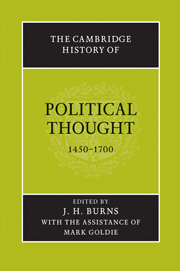Book contents
- Frontmatter
- Introduction
- I Renaissance and Counter-Renaissance
- II Religion, civil government, and the debate on constitutions
- III Absolutism and Revolution in the Seventeenth Century
- IV The end of Aristotelianism
- V Natural law and utility
- 19 Pufendorf
- 20 The reception of Hobbes
- 21 Locke
- Conclusion
- Biographies
- Bibliography
- Index of names of persons
- Index of subjects
- References
19 - Pufendorf
from V - Natural law and utility
Published online by Cambridge University Press: 28 March 2008
- Frontmatter
- Introduction
- I Renaissance and Counter-Renaissance
- II Religion, civil government, and the debate on constitutions
- III Absolutism and Revolution in the Seventeenth Century
- IV The end of Aristotelianism
- V Natural law and utility
- 19 Pufendorf
- 20 The reception of Hobbes
- 21 Locke
- Conclusion
- Biographies
- Bibliography
- Index of names of persons
- Index of subjects
- References
Summary
The Saxon philosopher Samuel Pufendorf has, for three reasons, an unusual place in the history of modern political thought. First, unlike Hobbes or Montesquieu, he has often been consigned to oblivion. He was famous in his own time and a central figure in eighteenth-century writing, through the texts translated, compiled and popularised by Jean Barbeyrac, Jean-Jacques Burlamaqui, and Jean-Jacques Rousseau. Gradually, however, his work became discredited, becoming overshadowed by Christian Thomasius, Christian Wolff, and Kant in Germany, and by Locke and Rousseau in the English and French traditions. His reputation was never secure, and even contemporaries passed contradictory judgements. Leibniz denigrated him as ‘no lawyer, and scarcely a philosopher at all’ (Leibniz 1768, p. 261). Thomasius lauded him as ‘the first in Germany to think of establishing a science of morality in accordance with mathematical methods’ (Thomasius 1719, p. 6). Secondly, unlike Bodin, Locke, or Rousseau, Pufendorf left a disparate body of work, seemingly lacking in unity and containing no major political text. He wrote voluminously on practical philosophy and public law, and monumental historical works. Yet he does not look like a classical political thinker. Thirdly, unlike, say, Machiavelli or More, Pufendorf's political thought is characterised not by the originality of his own ideas, but by his eclecticism. He borrowed the epistemological and methodological principles of the Jena Cartesian Erhard Weigel and sought to combine the opposing anthropological and political concepts of Hobbes and Grotius. Consequently, for a long time he was seen as ‘a thinker of secondary importance’, at worst ‘a dull and indigestible compiler’ (Derathé 1970, p. 78; Belime 1856, p. 11).
- Type
- Chapter
- Information
- The Cambridge History of Political Thought 1450–1700 , pp. 559 - 588Publisher: Cambridge University PressPrint publication year: 1991
References
- 2
- Cited by

